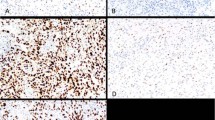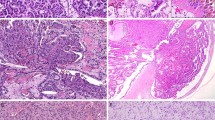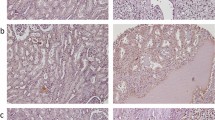Abstract
Alteration of the tumour-suppressor gene p53 is the commonest genetic change encountered in human malignant tumours. A study was undertaken to ascertain the prognostic value of p53 immunoexpression in nephroblastomas. A series of 93 consecutive cases was analysed. Archival formalin-fixed, paraffin wax-embedded tissue sections were stained with monoclonal anti-p53 antibody (DO-7, Dako) using a peroxidase-labelled streptavidin biotin kit. Five of seven tumours (71.4%) with unfavourable histology, but only 3 of 86 favourable histology tumours, showed 'high' p53 immunoexpression (P < 0.001). p53 expression in unfavourable histology tumours was present in both anaplastic and non-anaplastic components. Moreover, there was uniform staining of blastema, epithelium and stroma in unfavourable histology tumours. No statistical difference in p53 expression was found between patients who had received and those who had not received preoperative chemotherapy (P = 0.678). Similarly, no statistical difference was found in the groups of patients who were disease free, who had residual/recurrent disease or who had died (P = 0.238). The mean survival period for patients with tumours that had 'low' and 'high' expressions was 24.8 months and 12.6 months respectively (P = 0.0003). In conclusion, p53 immunoexpression in nephroblastomas was found to be an important determinant of poor prognosis as it identifies those patients with a shorter survival period and also those with unfavourable histology tumours. It may also be of practical value to the practising pathologist by identifying those tumours that require careful assessment for the presence of anaplasia.
This is a preview of subscription content, access via your institution
Access options
Subscribe to this journal
Receive 24 print issues and online access
$259.00 per year
only $10.79 per issue
Buy this article
- Purchase on Springer Link
- Instant access to full article PDF
Prices may be subject to local taxes which are calculated during checkout
Similar content being viewed by others
Author information
Authors and Affiliations
Rights and permissions
About this article
Cite this article
Govender, D., Harilal, P., Hadley, G. et al. p53 protein expression in nephroblastomas: a predictor of poor prognosis. Br J Cancer 77, 314–318 (1998). https://doi.org/10.1038/bjc.1998.48
Issue Date:
DOI: https://doi.org/10.1038/bjc.1998.48
This article is cited by
-
Immunohistochemical expression of P53 protein in nephroblastoma: a predictor of unfavorable prognosis
Journal of the Egyptian National Cancer Institute (2023)
-
Molecular and epidemiologic characterization of Wilms tumor from Baghdad, Iraq
World Journal of Pediatrics (2018)
-
Infrequent p53 Gene Mutations and Lack of p53 Protein Expression in Clear Cell Sarcoma of the Kidney: Immunohistochemical Study and Mutation Analysis of p53 in Renal Tumors of Unfavorable Prognosis
Modern Pathology (2002)
-
Prognostic value of p53 protein expression for patients with gastric cancer – a multivariate analysis
British Journal of Cancer (1999)



